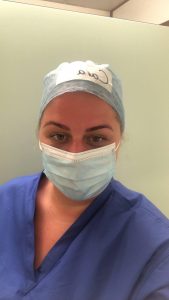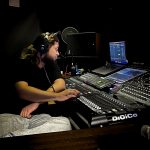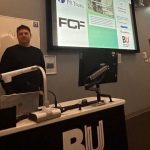 Produced by Guest blogger
Produced by Guest blogger
This is a guest blog post by current student Cara Ginnifer, studying BSc (Hons) Operating Department Practice.
I’m Cara, a first year student studying BSc (Hons) Operating Department Practice (ODP). Not many people know what an ODP is or that we exist – I personally think it’s one of the best careers in healthcare. I fell onto the ODP course by chance. I was made redundant during the pandemic and applied for a job working in operating theatres as a support worker. I was interviewed by two ODPs, they briefly told me about their role. Although I didn’t know if I had the job, I went away and researched the ODP role further. Shortly after starting as a Theatre Care Assistant I realised I loved working in the operating theatre, the atmosphere, teamwork, environment, everything gripped me. Fast forward six weeks after starting, I had applied to BU through Clearing and was accepted onto the ODP course. I didn’t want to wait for another year to start university so grabbed the opportunity whilst it was available to me. 
Course
The course has been affected by COVID; we have had most of the year online. The course is split into theory blocks and placement blocks; placement is usually 10 weeks and theory can be from 5-12 weeks. The first semester focused on group learning, anatomy and physiology (A&P) and surgical skills. There is a lot to learn! Even with a basic understanding of operating theatres, it was intense. One of the benefits of having lectures online was that the A&P sessions were recorded so we could go back and watch them again, which was handy if you didn’t understand something. The course continues in a pattern that you learn the theory then have placement for 10 weeks, so you use and develop the theory you’ve learnt. The theory is assessed through exams and assignments with each placement being assessed through a practical skills assessment.
Skills Lab
I mentioned the course is mostly online because we have had some face-to-face sessions. We’ve had skills sessions to cover areas such as moving and handling, basic life support (BLS), scrubbing (sterile hand washing), mounting sharps/blades and setting up the anaesthetic machine. It’s important to have these sessions so you can get hands on learning in addition to pre-recorded demonstrations. We’ve had sessions in the new Bournemouth Gateway Building which is brilliant because it’s similar to a theatre.
Placement
I’m fortunate that my placement hospital is where I was employed. Therefore, I didn’t have to worry about finding my way around. It wasn’t easy though and came with its own challenges. We were on our surgical placement during COVID, which resulted in fewer operations taking place. However, this meant that you had to take every opportunity you could to practise your skills and to push yourself. Placement is hard work and it’s challenging trying to bring all of your skills together, but it’s also rewarding. There is no feeling like being scrubbed in theatre and being able to support the surgeons. I’m looking forward to our next placement in anaesthetics!
Whilst I love everything about theatre life, it’s not all glamourous! The nature of the job means you are exposed to lots of new sights, smells and sounds which can be daunting but you get used to them and everything soon becomes familiar. Working in operating theatres can sometimes seem like a different world. However, I enjoy every minute of it and couldn’t imagine working towards a different career.
 My work placement as an ODP student
My work placement as an ODP student All you need to know about applying for the NHS Learning Support Fund
All you need to know about applying for the NHS Learning Support Fund








